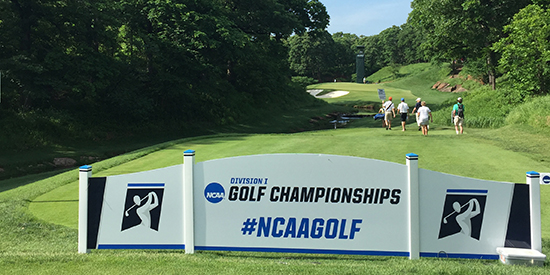Player blog: Must-ask questions of the recruiting process

AGC photo
Editor’s note: Nicholas Cummings is a 2018 high school graduate fresh out of the college-golf recruitment gauntlet. Cummings, a Massachusetts native who played the 2015 U.S. Amateur as a 15-year-old and was T-3 at this summer’s Francis Ouimet Memorial, will take his spot on the Boston College roster in the fall of 2019. In the meantime, Cummings has put down temporary roots in Sarasota, Fla., where he will work with longtime coach John Hulbert and gain more competitive golf experience. Throughout that process, Cummings will also contribute to AmateurGolf.com, providing a look at high-level amateur golf from the inside.
The college-recruiting process can be long. I should know – for me, it began the summer before my freshman year of high school and did not end until August of this past summer (yes, after I had graduated). During that time, I spoke to countless college coaches, took a dozen campus visits and looked at every kind of school. It was tough deciding which school made the most sense for me, but in the end I found the perfect match. I will start my college golf career at Boston College in the fall of 2019. I hope my perspective and the lessons I learned along the way will help those players still trying to find the best school to fit their personal goals.
Most college hopefuls begin the recruitment process by sending their grades and resumes to a wide variety of schools. It’s a shotgun approach, based on the hope that one of those schools may be interested. When a player hears back from those schools, it can be really hard to dissect each option and figure out which one is the best. At least, that was what I experienced.
At the start of my college search, I simply went after the most successful team, taking into account scores, team wins, post-season appearances, and individual player success. But was that really the best fit for me? During my four-year recruiting process, I saw all types of schools, programs, facilities, coaches and more. Before committing, I really had to think about what I wanted from a college golf program and my overall college experience. I spoke to everyone from program alumni to college counselors, and I kept coming back to three questions.
What are your plans after college?
What role do you want academics to play?
What do you want your overall college experience to be like?
Even though these may seem like relatively simple questions, when it came to making my decision, knowing the answers to them made the selection process much clearer. When I really took the time to break down each question, it helped me realize exactly what I wanted from a college-golf program. Let’s start with the first one.

|
Nicholas Cummings
|
What are your plans after college?
For me, this was a very difficult question to answer. However, for others, it may be more simple. I knew I wanted to have plenty of options in the working world if I decided not to turn pro, but I didn’t want to rule out the possibility of turning pro so I still wanted a strong golf program.
If you know you aren't going to turn pro, but still want a competitive college-golf experience, you may want to look at some programs where you can consistently make the traveling lineup. Think about it – when you first enter the working world as a fresh college graduate, you likely won’t have much time for tournaments. I wouldn’t want to risk spending my four years of college eligibility sitting on the bench.
If you do know that you will turn pro, you have a few more sub-questions to ask yourself. Do I need more national tournament experience? (If so, then you need a program where you will play consistently.) Do I need better facilities to work on my game or do I need a coach to help me technically? (Then that may call for something a bit different.) Only you can answer these questions, and it can help you understand what kind of program will help you achieve your goals.
Related: Does climate affect a player's development?
Related: The three sins of college recruiting
What role do you want academics to play?
From my experience, sometimes people can get so wrapped up in the ranking of the team, the coach’s personality, the team's schedule and tons of other factors that they overlook the details of the actual college they are trying to get into.
Even though everything I listed is important, many of those things can change year to year. The school, however, will not change. I have seen several golfers who had phenomenal junior careers commit to elite universities with elite golf programs. Even though their games may have been ready for the golf rigor, they weren’t ready for the academics. Their grades tanked and their game soon followed. This is why it’s so important to ask yourself what role you want academics to play in your college experience. Take it one step further and ask yourself what you are going to study. The answers to these two questions are essential to finding the right program for you. For example, if you want to be a mechanical engineer, going to a school with an elite golf program is probably not the right choice.
For example, although Georgia Tech is a top engineering school, you see very few kids on the team major in engineering because the time commitment between that and golf is simply too much. I think it’s important to understand what you can handle and make sure you know what kind of hourly commitment golf and academics will take at each school you look at.
What role do you want golf to play in your overall college experience?
This could be the most important question because it combines the first two and then some. If you are someone who is looking to have a more normal college experience, that could cross many schools off your list. For most D1 schools, between practices and traveling to events, you likely won’t be going to many football games in the fall. In fact, most coaches I spoke to in the recruiting process didn’t allow kids to join fraternities or other groups and clubs. It’s not really possible to play elite golf, be an engineering major, go to football games and have a general social life. College athletics often require sacrifices.
For me, a good education was a must. That’s why I will enroll in the undergraduate business school at Boston College. It is exactly the program I was looking for. Boston College is a member of the ACC so the golf is still strong even though the school is one of the farthest north in the conference. We can only work on our games so much during snowy Massachusetts winters, so the golf-life balance will be better than it would be in a place where climate allows for a full practice schedule year round. A winter offseason will allow me some time to be a normal student, enjoying hockey games and spending time with my peers.
I hope my recruiting journey will help you consider factors like what role you want golf to play within your college experience, and that that knowledge will help you figure out what college golf program is right for you.